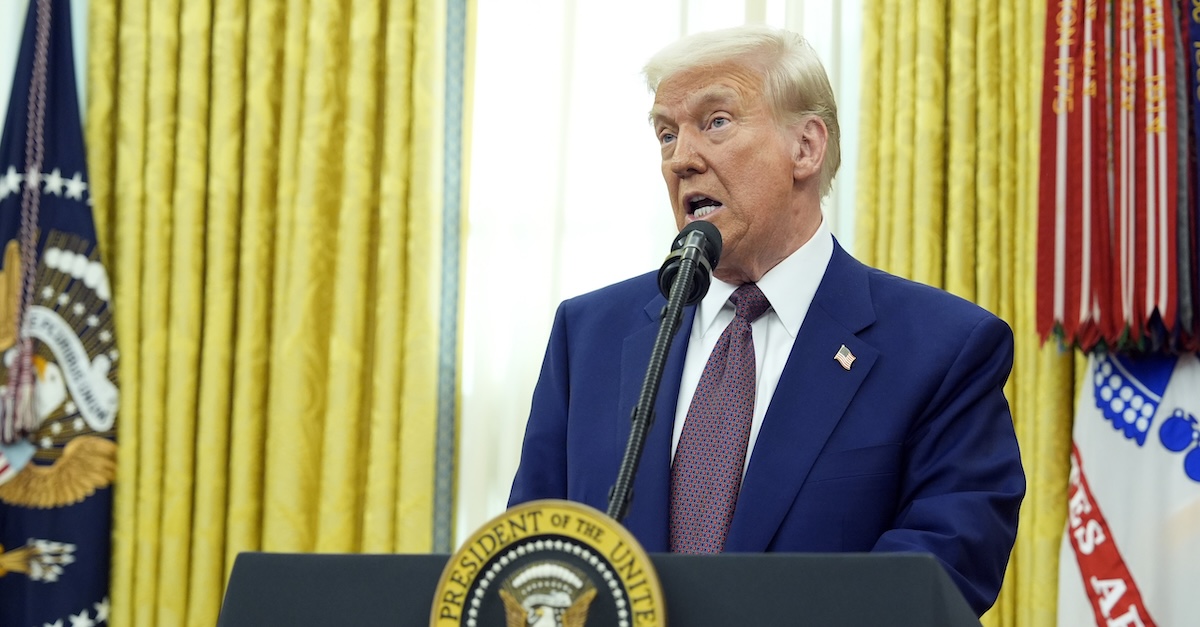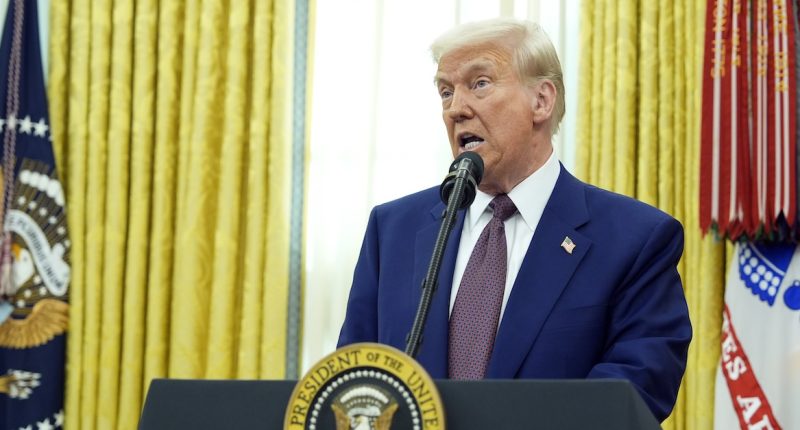
President Donald Trump speaks before Robert F. Kennedy Jr., is sworn in as HHS Secretary in the Oval Office, Thursday, Feb. 13, 2025, in Washington (Photo/Alex Brandon).
Illinois‘ attorney general is urging a federal judge to toss out a lawsuit filed by the Trump administration over the state’s sanctuary protections for undocumented immigrants, arguing that the federal government cannot “coerce” states to enforce federal immigration policy.
The Justice Department earlier this month sued Illinois, the City of Chicago, and Cook County, seeking a court order prohibiting the enforcement of local laws — namely the Way Forward Act, TRUST Act, and the Welcoming City Act — alleging that they were “are designed to and in fact interfere with and discriminate against the Federal Government’s enforcement of federal immigration law.”
The laws prevent local law enforcement from enforcing federal immigration law without a warrant (Way Forward Act), prohibit arrests or holdings based solely on immigration status (TRUST act), and allow immigrants in the country illegally access to schools and medical care (Welcoming City Act). States and cities that maintain such laws typically assert that they make residents safer by allowing undocumented victims and witnesses of crimes to work with law enforcement without fear of deportation.
The suit is based on President Donald Trump’s executive order in which he declared a “national emergency” exists in the U.S. as a result of illegal immigration and contends that such state laws violate the Supremacy Clause of the U.S. Constitution.
“Many of these aliens unlawfully within the United States present significant threats to national security and public safety, committing vile and heinous acts against innocent Americans,” the government’s complaint states. “Further exacerbating this national crisis, some of these aliens find safe havens from federal law enforcement detection in so-called Sanctuary Cities where they live and work among innocent Americans, who may later become their crime victims.”
In seeking to have the case dismissed, Illinois argues that the Trump administration is seeking to “nullify” state laws specifically designed to limit the assistance state and local law enforcement provide to federal immigration agents, stating, “the Constitution forbids that result.”
“The chief executive of the federal government may have recently changed, but the nation’s constitutional structure has not,” the motion to dismiss says. “That structure preserves states’ status as dual sovereigns within a federalist system.”
Under such a structure, states typically maintain the right to direct law enforcement when it comes to the exercise of the state’s police power, particularly the “core power” of deciding “whom to arrest and for what conduct,” the motion to dismiss argues. States may choose to have their officers assist federal agents, the filing continues, but “states cannot be forced to do so.”
“Illinois’s choice may ‘frustrate’ implementation of ‘federal schemes,’ like the current federal executive’s avowed commitment to conduct the largest mass deportation in American history,” the filing states. “But this frustration is not obstacle preemption when the Tenth Amendment protects Illinois’s sovereign right not to cooperate in the President’s schemes.”
The administration’s case is threefold: asserting that Illinois immigration laws are preempted by federal law, discriminate against the federal government, and amount to unlawful regulation of the federal government.
The state responded by proclaiming that all of the administration’s claims fail under the 10th Amendment — which reserves to the states any powers the U.S. Constitution does not specifically grant to the federal government — and the anti-commandeering doctrine, which prevents the Justice Department from requiring states to adopt or enforce federal law.
Love true crime? Sign up for our newsletter, The Law&Crime Docket, to get the latest real-life crime stories delivered right to your inbox.
“The grievances in the complaint about Illinois’s laws do not cure this foundational defect. Illinois’s choice not to assist in enforcing federal immigration law may require federal officers to exert their own effort to increase deportations,” Illinois’ motion states. “But that outcome is a feature of our constitutional design, not an obstacle to it. Nor can Illinois’s constitutionally protected choice not to assist federal authorities with deportation be transformed into regulation of or discrimination against the federal government. Every claim in the complaint fails and should be dismissed with prejudice.”
Chicago Mayor Mike Johnston will join the mayors of Denver, Boston, and New York City on Wednesday when they appear before the House Committee on Oversight and Government Reform to speak about their cities’ respective immigration laws.




